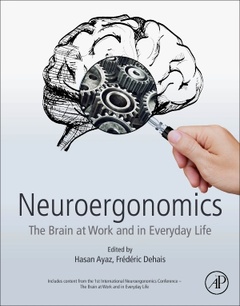Neuroergonomics The Brain at Work and in Everyday Life
Coordonnateurs : Ayaz Hasan, Dehais Frederic

Neuroergonomics: The Brain at Work and in Everyday Life details the methodologies that are useful for keeping an ideal human-machine system up-to-date, along with information on how to prevent potential overload and minimize errors. It discusses neural measures and the proper methods and technologies to maximize performance, thus providing a resource for neuroscientists who want to learn more about the technologies and real-time tools that can help them assess cognitive and motivational states of human operators and close the loop for advanced human-machine interaction.
With the advent of new and improved tools that allow monitoring of brain activity in the field and better identification of neurophysiological markers that can index impending overload or fatigue, this book is a timely resource on the topic.
Introduction 1. Progress and Direction in Neuroergonomics
Methods 2. Electroencephelography for Neuroergonomics 3. Functional Near Infrared Spectroscopy for Neuroergonomics 4. Why is eye-tracking an essential part of Neuroergonomics? 5. The use of tDCS and rTMS methods in Neuroergonomics 6. Brain Computer Interfaces for Neuroergonomics 7. Transcranial Doppler Sonography for Neuroergonomics 8. Simulators and Behavioral Research Methods for Neuroergonomics 9. Neuroergonomics for Aviation 10. MoBI – Mobile Brain Body Imaging 11. Experiments with participants: Some ethical considerations
Neuroadaptive Interfaces and Operator Assessment 12. Measuring the Redline for Mental Overload Using EEG and fNIRS: A Role for Neural Efficiency? 13. Drowsiness Detection during Driving Task Using fNIRS 14. Neuroergonomic Multimodal Neuroimaging During a Simulated Aviation Pursuit Task 15. Is Mindfulness Helping the Brain to Drive? 16. Tracking Team Mental Workload by Multimodal Measurements in The Operating Room 17. Towards Brain-Based Interaction Between Humans and Technology: Does Age Matter? 18. Curvilinear Basis for Cognitive Load State Classification 19. Computational Models for Near Real-Time Performance Predictions Based on Physiological Measures of Workload 20. Mental Workload Assessment as Taxonomic Tool for Neuroergonomics 21. Preliminary Validation of an Adaptive Tactical Training Model: Cognitive Alignment with Performance Targeted Training Intervention Model
Neurostimulation Applications 22. Concurrent fNIRS and TMS for Neurocognitive Enhancement on a Speed of Processing Task 23. Neuromodulatory Effects of Transcranial Direct Current Stimulation Revealed by Functional Magnetic Resonance Imaging 24. Neurophysiological Correlates of tDCS-induced Modulation of Cortical Sensorimotor Networks: A Simultaneous fNIRS-EEG study 25. The use of Online/Offline Terminology for Transcranial Direct Current
Emerging Applications in Decision-making, Usability, Trust and Emotions 26. Neural Signatures of Advice Utilization During Human-Machine Agent Interactions: Functional Magnetic Resonance Imaging and Effective Connectivity Evidence 27. Psychophysical Equivalence of Static Versus Dynamic Stimuli in a Two Alternative Forced Choice Detection Task 28. Functional Near Infrared Spectroscopy: Proof of Concept for its Application in Social Neuroscience 29. Quantifying Brain Hemodynamics during Neuromuscular Fatigue 30. The Assessment of Emotions and Decision Making in Everyday Living Using fNIRS 31. Web Usability Testing with Concurrent fNIRS and Eye Tracking 32. Hybrid Collaborative Brain-Computer Interfaces to Augment Group Decision Making 33. How to Recognize Emotion Without Signal Processing: An Application of Convolutional Neural Network to Physiological Signals
Entries from the Inaugural International Neuroergonomics Conference
Dr. Ayaz’s research focuses on understanding the neural mechanisms underlying human cognitive and motor functioning with emphasis on real-world contexts, mobile neuroimaging, and neuroengineering approaches for neuroergonomics applications. His research aims to design, develop, and utilize (i.e. to measure->elucidate->enable) next-generation brain imaging for neuroergonomic applications over a broad-spectrum from aerospace to healthcare. His research has been funded by federal agencies, corporate partners and foundations, and output over 200 publications in international journals and conferences.
For over 17 years, he worked on the development of miniaturized optical brain monitoring systems focusing on imaging in natural environments and everyday settings. He has designed and developed multiple continuous-wave near infra-red spectroscopy instruments that are now in routine use for clinical and field research in hundreds of university, governmental and corporate research labs. As an extension to this, he led the software design and development of the first handheld optical-brain-monitoring medical device, Infrascanner, that received de novo FDA approval, utilizes near-infrared light to detect hematoma in head trauma patients, tested with 12 independent clinical studies with over 1,200 patients and currently deployed in 42 countries/6 continents in both civilian and military hospitals, already became the standard of care for children and sports medicine in some European countries.
Dr. Dehais is a full professor at the Institut Supérieur de l’Aéronautique et de l’Espace (France) a
- Includes neurobiological models to better understand risky decision-making and cognitive countermeasures, augmented cognition, and brain stimulations to enhance performance and mitigate human error
- Features innovative methodologies and protocols using psychophysiological measurements and brain imaging techniques in realistic operational settings
- Discusses numerous topics, including cognitive performance in psychological and neurological disorders, brain computer interfaces (BCI), and human performance monitoring in ecological conditions, virtual reality, and serious gaming
Date de parution : 11-2018
Ouvrage de 366 p.
21.4x27.6 cm
Thème de Neuroergonomics :
Mots-clés :
(VR)Abrupt change; Action; Active stimulation; Actual driving conditions; Actual versus sham stimulation; Adaptation time; Adaptation; Adapted-workload transitions; Adaptive assistive systems; Adaptive automation; Adaptive flight systems; Adaptive gaming; Adaptive intelligent interface; Adaptive systems; Adaptive training; Adjustments; Advance planning; Advanced driving assistance systems; Adverse effects; Advice taking; Aerospace; Affect; Age; Age-related effects; Aggressive behavior; Aging; Air traffic control; Air traffic controllers; Alerted conditions; Alertness; Algorithm; Algorithms; Amplitude; Amplitude-amplitude coupling; Amyotrophic lateral sclerosis; Anger; Ankle foot orthosis; Ankle hypomobility; Anonymization; ANOVA; ANOVAs; Anticipation; Anticipatory postural adjustments; Aortic stenosis; Aortic valve replacement; Appearance; Artistic domain; Asymmetrical interaction; Attention allocation; Attention manipulation; Attention metrics; Attention



